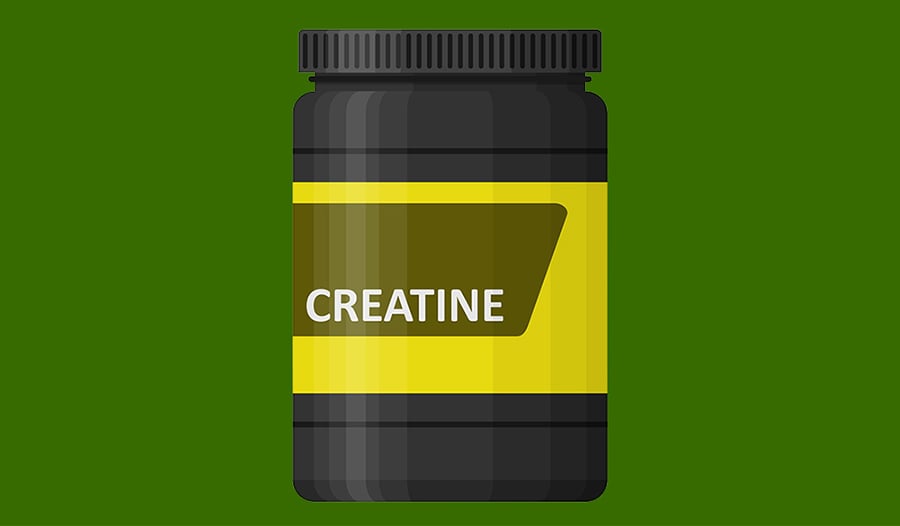Can Creatine Support Muscle Mass and Exercise Performance?
DISCLAIMER:This blog does not intend to provide diagnosis...
- In this article:
- What Is Creatine?
- Exercise Performance
- Enhanced Heat Tolerance
- Enhanced Recovery
- Injury Prevention
- Aging and Cognition
- Brain and Spinal Cord Neuroprotection
- Depression
- Pregnancy
- Neurodegenerative Diseases
- So, Should You Take It?

Creatine monohydrate is one of the most popular and well-studied sports performance supplements. It is usually taken to improve exercise performance and increase muscle mass. A large body of research demonstrates that supplementing with creatine may enhance exercise recovery, help prevent injuries, and protect from concussions.
But did you know there are many other benefits of creatine unrelated to exercise? Recent research suggests creatine has other clinical applications and may be helpful in areas such as aging, brain health, neurodegenerative diseases, diabetes, osteoarthritis, fibromyalgia, depression, and pregnancy.1
Let’s dive in to learn more about creatine, its many benefits, and whether you should be taking it.
What Is Creatine?
Before we get into the benefits of creatine, let’s discuss what creatine is. Creatine is a combination of three different amino acids and is made naturally in the body. It is mainly produced in the liver and stored in the muscles.1 Through enzymatic reactions in the muscles, creatine can help increase energy production.2
Creatine is also naturally found in very small amounts in certain foods, such as red meat and seafood.1 Because it isn’t widely available in food, it can be very beneficial to supplement with creatine.
Numerous studies have shown that short- and long-term creatine supplementation is safe in doses up to 30g per day for five years in people of all ages. Most creatine supplements provide around 3 to 5g per day, so it’s unlikely you’d ever take more than the upper limit of 30g.1
Contrary to popular belief, creatine is not a steroid. It is a widely researched supplement that is recognized as safe by the U.S. Food and Drug Administration (FDA).1,2
Exercise Performance
A large body of evidence shows that taking creatine supplements increases muscle creatine stores and improves your muscles’ access to creatine. This leads to enhanced exercise performance in people of all ages and genders.1
Creatine can be thought of as an “energy shuttle.” Your body uses a type of energy known as adenosine triphosphate, or ATP. When your body uses energy, ATP loses one phosphate and is converted into adenosine diphosphate, or ADP. Your body cannot use energy in the form of ADP until it is converted back into ATP. Creatine helps give you more energy by donating one of its phosphate groups to convert ADP back to usable ATP.
Because creatine helps increase ATP stores, it helps athletes train for longer and at a higher intensity.1 This improved quality of your training leads to increased strength, muscle mass, and performance.
If you’re still on the fence about whether to supplement with creatine, know that studies suggest creatine can increase the performance of high-intensity or repetitive exercises by 10 to 20%.3 The International Society of Sports Nutrition (ISSN), American Dietetic Association (ADA), and the American College of Sports Medicine (ACSM) have all concluded that creatine monohydrate is the most effective supplement currently available for increasing exercise performance and muscle mass.1
Enhanced Heat Tolerance
Creatine has osmotic properties, meaning it can retain a small amount of water. Because of its ability to hyper-hydrate the body, creatine supplementation may help improve your tolerance for exercise in the heat.3
In one study, creatine supplementation increased water retention, resulting in lower body temperatures and heart rate during prolonged exercise in the heat. Because of this unique quality, taking a higher dose of creatine a few days before a prolonged athletic event in the heat—around 20g for seven days—may help reduce your risk of heat-related illness.4
Enhanced Recovery
Creatine doesn’t just help you during your workout—studies suggest creatine supplementation may help reduce muscle damage and improve recovery after exercise.
When creatine is ingested with a large number of carbohydrates—about 50 to 100g of glucose—creatine and carbohydrate storage in muscle is enhanced.5 One study found that adding 50 grams of protein along with carbohydrates and creatine enhances creatine retention even further.6
Glucose helps replenish depleted glycogen stores in the muscle. This helps promote recovery and prevents overtraining during intense exercise sessions. By supplementing with creatine, athletes who deplete the glycogen stores in their muscles can improve their performance during training sessions.1
Research also suggests that creatine may play a role in reducing muscle damage. In one study, athletes supplementing with creatine had significantly greater knee extension strength during recovery from exercise-induced muscle damage. They had less muscle damage and faster recovery from exercise.7
Another study found inflammation markers were significantly lower during recovery in those who had supplemented with creatine than those who had not.8 These findings have been observed in both runners and weightlifters, suggesting that creatine supplementation may be beneficial for recovery from both aerobic and anaerobic exercises.1
Injury Prevention
Current research reveals that athletes who take creatine during training sessions and competition experience fewer injuries than those who do not.1 These findings have been observed in football, soccer, and basketball.
In one study, football players who supplemented with 5g of creatine per day for four months had significantly less muscle cramping, heat illness, dehydration, muscle tightness, and muscle strains compared to football players who did not take creatine.9
Aging and Cognition
As we age, many of us experience loss of bone density, loss of muscle mass, and cognitive decline. Research suggests creatine can improve overall health as we age by slowing the progression of osteoarthritis, lowering cholesterol and triglyceride levels, enhancing glycemic control, slowing tumor growth in some cancers, minimizing bone loss, increasing strength, and improving cognitive function.1
One study found supplementing with 5g of creatine per day for six weeks improved working memory and performance on intelligence tests.10 In elderly participants, creatine supplementation significantly improved performance on spatial recall, memory, and random number generation tests.11 Because creatine is naturally present in the brain, supplementing with additional creatine can reduce mental fatigue and improve cognitive function.1
Brain and Spinal Cord Neuroprotection
Creatine’s neuroprotective effects may be especially beneficial for people who participate in sports and exercises with a high risk of concussion. Scientists are examining creatine’s effects on traumatic brain injuries (TBI), spinal cord injuries (SCI), and cerebral ischemia (inadequate blood supply to the brain).1
Research on these conditions suggests creatine can improve locomotor function and provide neuroprotective benefits in patients receiving spinal surgery who are at risk for SCI.1
In addition, creatine supplementation helps reduce brain infarct size following an ischemic event by 40%.12 In animal studies, creatine has reduced neuronal cell death, provided neuroprotection after cerebral ischemia, and reduced loss of gray matter following an SCI.
These findings suggest that creatine supplementation may limit damage from concussions, TBI, or SCI, which could benefit athletes.1
Depression
Research has shown that creatine metabolism in the brain is altered in people with depression. Supplementing with creatine monohydrate increases creatine levels in the brain, suggesting that creatine may be helpful as a form of antidepressant treatment.
Animal studies have shown that creatine may function as a neurotransmitter and can exert an antidepressant-like effect.13 More human studies are needed in this promising area of research.
Pregnancy
Pregnancy presents an increased demand for creatine. The fetus depends on creatine from the mother until late into the pregnancy with significant changes occurring in creatine synthesis as pregnancy progresses.
Supplementing with creatine during pregnancy may improve newborn survival and organ function following birth asphyxia, when a baby is deprived of oxygen during birth. Additional research suggests creatine may also benefit fetal growth, development, and overall health.14, 15
Neurodegenerative Diseases
Scientists are investigating creatine’s promising short- and long-term benefits for individuals with neuromuscular diseases. Studies have shown that creatine supplementation can improve exercise capacity and clinical outcomes in patients with muscular dystrophy, Huntington’s disease, Parkinson’s disease, and Lou Gehrig’s disease.1
So, Should You Take It?
Creatine monohydrate remains one of the most studied nutritional supplements that consistently shows benefits for enhanced physical performance, increased muscle mass, and exercise recovery. Beyond exercise performance, a large body of evidence demonstrates creatine’s many benefits for improved cognition, lowered cholesterol levels, and fetal growth.
Creatine is affordable and safe for use by people of all ages and populations. You don’t have to be an athlete to benefit from creatine—though it’s always a good idea to consult your physician or other qualified healthcare provider before beginning a new supplement.
References:
- Kreider RB, Kalman DS, Antonio J, et al. International Society of Sports Nutrition position stand: safety and efficacy of creatine supplementation in exercise, sport, and medicine. J Int Soc Sports Nutr. 2017;14:18. Published 2017 Jun 13. doi:10.1186/s12970-017-0173-z
- Jagim AR, Kerksick CM. Creatine Supplementation in Children and Adolescents. Nutrients. 2021;13(2):664. Published 2021 Feb 18. doi:10.3390/nu13020664
- Kreider RB. Effects of creatine supplementation on performance and training adaptations. Mol Cell Biochem. 2003;244(1–2):89–94. doi: 10.1023/A:1022465203458.
- Kilduff LP, et al. The effects of creatine supplementation on cardiovascular, metabolic, and thermoregulatory responses during exercise in the heat in endurance-trained humans. Int J Sport Nutr Exerc Metab. 2004;14(4):443–460. doi: 10.1123/ijsnem.14.4.443.
- Green AL, et al. Carbohydrate ingestion augments skeletal muscle creatine accumulation during creatine supplementation in humans. Am J Physiol. 1996;271(5 Pt 1):E821–E826.
- Steenge GR, Simpson EJ, Greenhaff PL. Protein- and carbohydrate-induced augmentation of whole body creatine retention in humans. J Appl Physiol (1985) 2000;89(3):1165–1171.
- Cooke MB, et al. Creatine supplementation enhances muscle force recovery after eccentrically-induced muscle damage in healthy individuals. J Int Soc Sports Nutr. 2009;6:13. doi: 10.1186/1550-2783-6-13.
- Deminice R, et al. Effects of creatine supplementation on oxidative stress and inflammatory markers after repeated-sprint exercise in humans. Nutrition. 2013;29(9):1127–1132. doi: 10.1016/j.nut.2013.03.003.
- Greenwood M, et al. Cramping and injury incidence in collegiate football players Are reduced by creatine supplementation. J Athl Train. 2003;38(3):216–219.
- Rae C, et al. Oral creatine monohydrate supplementation improves brain performance: a double-blind, placebo-controlled, cross-over trial. Proc Biol Sci. 2003;270(1529):2147–2150. doi: 10.1098/rspb.2003.2492
- McMorris T, et al. Effect of creatine supplementation and sleep deprivation, with mild exercise, on cognitive and psychomotor performance, mood state, and plasma concentrations of catecholamines and cortisol. Psychopharmacology (Berl) 2006;185(1):93–103. doi: 10.1007/s00213-005-0269-z.
- Prass K, et al. Improved reperfusion and neuroprotection by creatine in a mouse model of stroke. J Cereb Blood Flow Metab. 2007;27(3):452–459. doi: 10.1038/sj.jcbfm.9600351.
- Kious BM, Kondo DG, Renshaw PF. Creatine for the Treatment of Depression. Biomolecules. 2019;9(9):406. Published 2019 Aug 23. doi:10.3390/biom9090406
- Ellery SJ, Walker DW, Dickinson H. Creatine for women: a review of the relationship between creatine and the reproductive cycle and female-specific benefits of creatine therapy. Amino Acids. 2016;48(8):1807–1817. doi: 10.1007/s00726-016-2199-y
- Dickinson H, et al. Creatine supplementation during pregnancy: summary of experimental studies suggesting a treatment to improve fetal and neonatal morbidity and reduce mortality in high-risk human pregnancy. BMC Pregnancy Childbirth. 2014;14:150. doi: 10.1186/1471-2393-14-150.

 By Jim White, RDN
By Jim White, RDN


